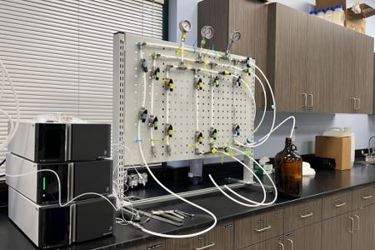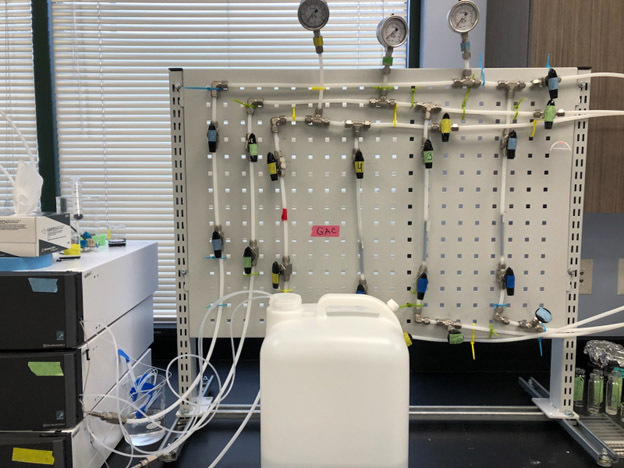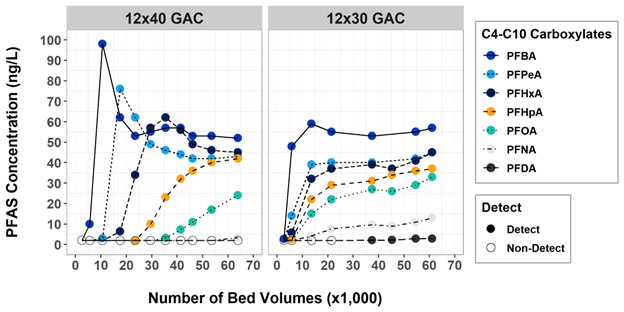Rapid Small-Scale Column Tests For PFAS Treatment Evaluation
By Rosa Yu

Granular activated carbon (GAC) and ion exchange (IX) resin are among the best available technologies for per- and polyfluoroalkyl substances (PFAS) treatment in water. Evaluating their performance is imperative when selecting the most cost-effective treatment technology for the job. However, predicting full-scale PFAS treatment performance by GAC or IX resin is intricate due to site-specific conditions like influent PFAS speciation and concentrations, the presence of competing constituents (e.g., dissolved organic carbon, or DOC), and system design criteria, such as GAC or IX resin type, empty bed contact time (EBCT), hydraulic loading rate (HLR), etc.
Pilot columns, which use the same GAC or IX resin products, adsorber design, and influent water as the full-scale system, provide the most accurate estimations of PFAS treatment performance. However, pilots can be costly and time-consuming, taking months or even years before PFAS breakthroughs can be observed from the tested media.
Rapid small-scale column tests (RSSCTs) utilize mini-columns, smaller-size media, and established scaling equations to evaluate the performance of GAC and IX resin at the bench-scale in only a few weeks, as compared to months or years that are typically needed for pilot studies. By grinding the GAC or IX resin into smaller sizes, RSSCTs compress the full-scale adsorber operation duration by 30 to 50 times (e.g., from 30 months at full-scale to 0.6 months or 2.5 weeks at bench-scale). The short operation time of RSSCT columns enables a quick turnaround of testing results to facilitate expeditious decision-making on technology selection and determination of critical design criteria (e.g., EBCT).
RSSCTs offer significant advantages over pilot columns, including less time, lower costs, less media, smaller sample volume, and faster data turnaround. Results of the RSSCT can be used to support critical decisions about treatment technologies, media products, design criteria, and operation and maintenance (O&M) costs.
Carollo Engineers' Water Applied Research Center (Water ARC®) in Boise, Idaho, is equipped to perform RSSCTs for PFAS treatment performance evaluation. Combined with our PFAS treatment and design expertise, we assist clients identify the most cost-effective PFAS treatment solutions in a timely manner.
Carollo is here to help:
- Review water quality and PFAS data to screen applicable technologies.
- Recommend cost-effective media products.
- Design RSSCTs that are customized to your site-specific conditions.
- Conduct RSSCTs at our in-house lab — Water ARC.
- Summarize results and provide recommendations on treatment technologies and design criteria.
- Provide more accurate estimates of O&M costs for PFAS treatment.


Rosa Yu, PhD, PE, is a lead technologist at Carollo Engineers. Rosa has over 10 years of experience in emerging contaminants and their treatment by advanced treatment processes. Rosa works at the interface of engineering and applied research and her primary focus is on the identification and development of innovative treatment technologies and control strategies in addressing emerging contaminants in drinking water and potable reuse.
